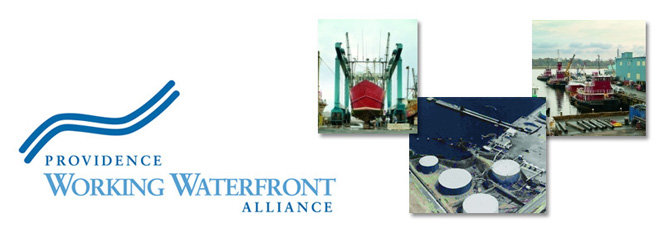Today’s Providence Journal has an excellent editorial supporting the Rhode Island Working Waterfronts Protection Act:
Rhode Island must nurture its comparative advantages.
Cheers, then, to Representatives David Caprio (D.-Narragansett), Donald Lally (D.-South Kingstown), John McCauley (D.-Providence) and Joseph Almeida (D.-Providence), and Senators William Walaska (D.-Warwick) and Daniel Connors (D.-Cumberland) for backing legislation to protect Rhode Island’s working waterfronts — including those at Quonset, in North Kingstown, Melville Marine, in Portsmouth, and along Allens Avenue, in Providence.
Rather than becoming the subject of endless study, these companion bills should be moved through now — before working ports are threatened even more.
Modeled closely on the Bay State’s successful Designated Port Area regulations, the legislation would protect the industries operating around ports, and the well-paying blue-collar jobs they create, from the purely local opponents of waterfront industry and the predations of developers of marinas and condominiums. Under the bill, the state Coastal Resources Management Council would develop guidelines for protecting working ports.
Other states have recognized that ports are vital economic resources, creating jobs with regional impact, and that their use should be governed with a broader perspective than a local community alone brings.
When local communities are given carte blanche over ports, for example, they often try to bring in glitzy development that could threaten industrial work, because their interest is in maximizing property taxes rather than protecting and creating private-sector jobs. Thus, Providence is flirting with endangering its working waterfront.
It should be clear by now to even the most obtuse observer that Rhode Island desperately needs the kind of jobs that working ports provide: high-paying blue-collar jobs with good benefits. With the unemployment rate standing at a brutal 10.3 percent, the Ocean State certainly could use such jobs more than another empty condo project. In any event, condos could be built in any number of places besides in the middle of an economically vibrant port.
Keith Stokes, executive director of the Newport County Chamber of Commerce, notes that three-quarters of the workforce in Rhode Island lacks a college degree. “This is a blue-collar state,” he said. “We are losing blue-collar jobs” by failing to protect working ports. Many skilled carpenters, fiberglass workers, machinists and more depend on jobs along the waterfront.
“People seem to have forgotten that, in colonial times, Newport had the fourth largest shipping port in all of America,” he notes. That is because Narragansett Bay is one of the deepest and most compact bays in America, making it a natural for maritime jobs. Yet, during the last 20 years, the state’s working waterfront has been slowly strangled.
Some fear that the bill could threaten such projects as the $150 million Heritage Harbor Museum, in Providence. But the legislation could be amended to protect that very (too?) ambitious project, long on the drawing board.
The bottom line is, the state should have a say in protecting vital economic interests. Such legislation could then be a step toward fully developing these valuable resources, especially at the sorely underused Quonset.
Last year, the General Assembly let a similar bill languish. This year, leaders should recognize that there is no more time to waste. Rhode Island needs to protect, and expand, its high-paying jobs now.
On the same note, the Assembly should get its special commission on ports into gear, and begin holding hearings about developing bigger ports at Quonset and Providence. The well-being of many thousands of Rhode Islanders, and the vibrancy of the region’s economy, are at stake.

